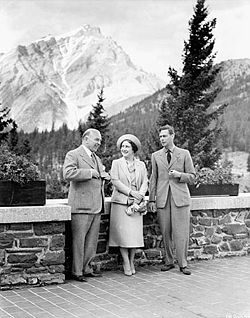Below is the speech, given by William Lyon Mackenzie King during the debate on the address in reply on September 8, 1939: [31]
Recommendation of Canadian Declaration of War on Germany
For months – indeed for years – the shadow of impending conflict in Europe has been ever present. Through these troubled years no stone has been left unturned, no road unexplored in patient search for peace.
Unhappily for the world, Herr Hitler and the Nazi regime in Germany have persisted in their attempt to extend their control over other peoples and countries, and to pursue their aggressive designs in wanton disregard of all treaty obligations, and peaceful methods of adjusting international disputes. They have had to resort increasingly to agencies of deception, terrorism and violence. It is this reliance upon force, this lust for conquest, this determination to dominate throughout the world which is the real cause of the war that today threatens the freedom of mankind.
The fate of a single city, the preservation of the independence of a particular nation are the occasion, not the real cause, of the present conflict. The forces of evil have been loosed in the world in a struggle between the pagan conception of a social order which ignores the individual and is based upon the doctrine of might and a civilization based upon the Christian conception of the brotherhood of man, with its regard for the sanctity of contractual relations and the sacredness of human personality.
As President Roosevelt said on opening Congress on January 4: "There comes a time in the affairs of men when they must prepare to defend, not their homes alone, but the tenets of faiths and humanity on which their churches, their Governments, and their very civilizations are founded. The defense of religion, of democracy, and of good faith among nations is all the same fight. To save one we must make up our minds to save all."
This, I believe, is the position in which all nations that cherish free institutions, individual liberty and social justice find themselves today.
I need not review the events of the last few days. They must be present in the minds of all. Despite her unceasing efforts to preserve the peace of Europe, the United Kingdom has today, in the determination to honour her pledges and meet her treaty obligations, become involved in war.
This morning the King [ George VI ], speaking to his peoples at home and across the seas, appealed to all to make their own the cause of freedom, which Britain again has taken up. Canada has already answered that call. On Friday last, the Government, speaking on behalf of the Canadian people, announced that in the event of the United Kingdom becoming engaged in war in the effort to resist aggression, they would, as soon as Parliament meets, seek its authority for effective cooperation by Canada at the side of Britain.
As you are aware, I have all along felt that the danger of war was such that Parliament should not be dissolved, but be available to consider any emergency that might arise. Parliament will meet Thursday next. Between now and then all necessary measures will be taken for the defense of Canada. Consultations with the United Kingdom will be continued. In the light of all the information at its disposal, the government will then recommend to Parliament the measures which it believes to be the most effective for cooperation and defence.
That Parliament will sanction all necessary measures, I have not the least doubt. Already I have received from the Leader of the Opposition [ Robert James Manion ], and from representatives of the other parties in the House of Commons, assurances of their full appreciation of the gravity of the situation, and of their desire to see that such measures are adopted as in the present crisis will best serve the national interest.
Our first concern is with the defence of Canada. To be helpful to others, we must ourselves be strong, secure and united. In anticipation of a state of war, the Government has already availed itself of the provisions of the War Measures Act, to take essential measures for the defense of our coasts, our land and our people. As has already been announced, the militia of Canada, the naval service and the air force are already on active service.
This morning these measures were supplemented by others including the proclamation of the Defence of Canada Regulations. Measures have also been taken to prevent profiteering in the necessaries of life. Of the latter measures my colleague, the Minister of Labour, will speak to you in a moment. In what manner and to what extent Canada may most effectively be able to cooperate in the common cause is, as I have already stated, something which Parliament itself will decide. All I need to add at the moment is that Canada, as a free nation of the British Commonwealth, is bringing her cooperation voluntarily. Our effort will be voluntary.
The people of Canada will, I know, face the days of stress and strain which lie ahead with calm and resolute courage. There is no home in Canada, no family, and no individual whose fortunes and freedom are not bound up in the present struggle. I appeal to my fellow Canadians to unite in a national effort to save from destruction all that makes life itself worth living, and to preserve for future generations those liberties and institutions which others have bequeathed to us.






